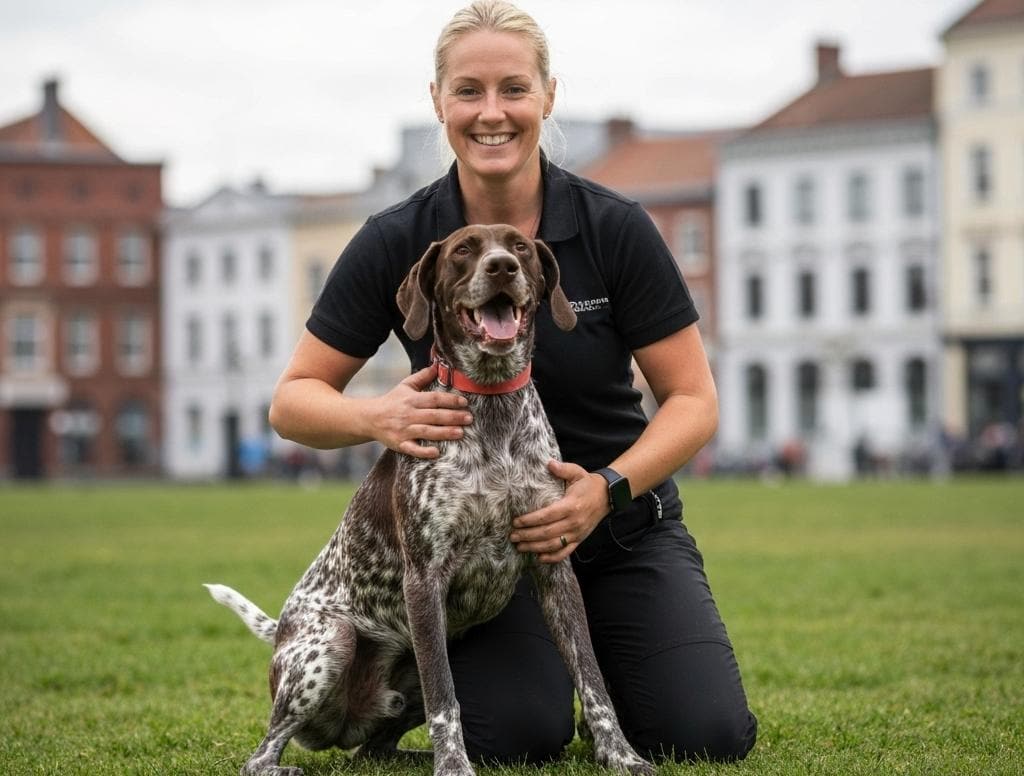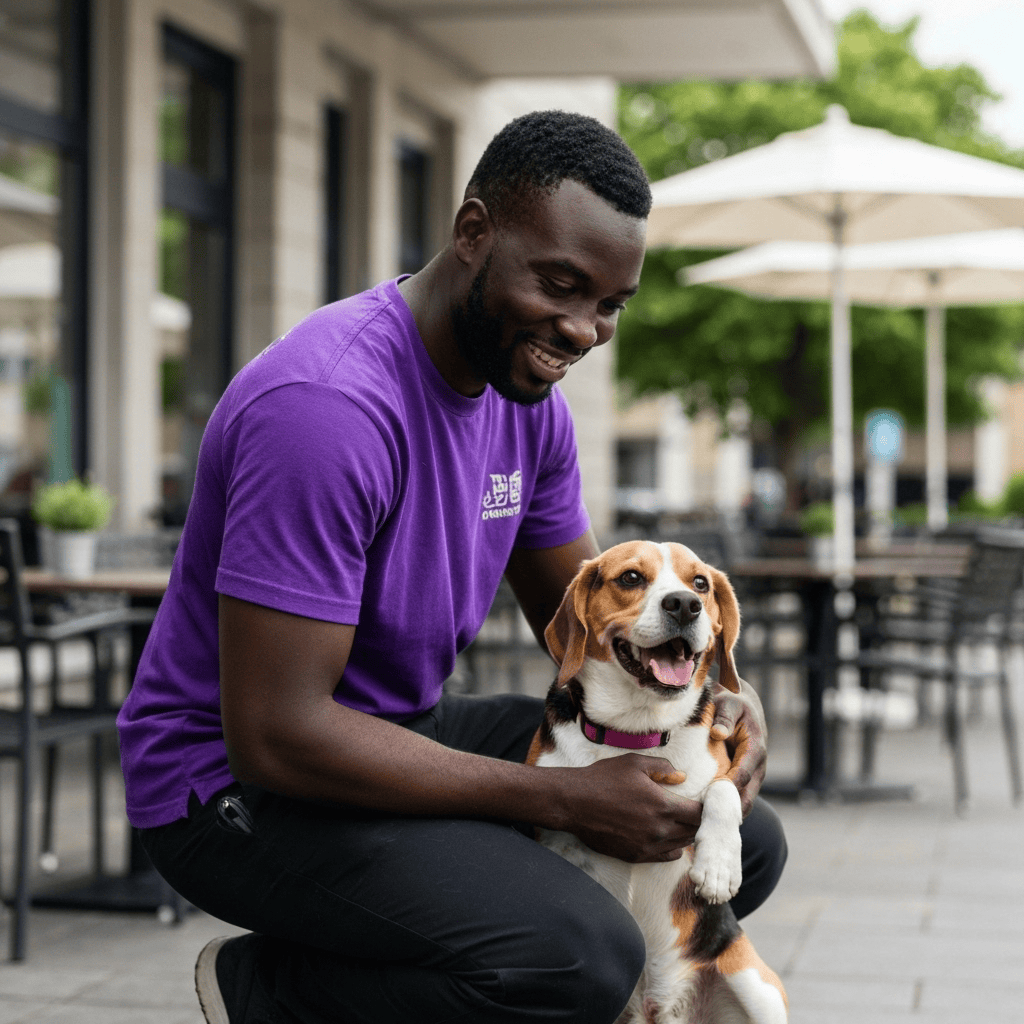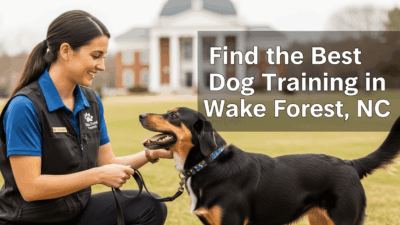Your Complete Guide to Choosing a Dog Trainer in Wake Forest, NC
When you’re walking your dog through E. Carroll Joyner Park or navigating the busy sidewalks along South Main Street, you want a pup who can handle whatever Wake Forest throws their way. The right training makes those everyday moments enjoyable instead of stressful.
Since Wake Forest sits in both Wake County and a small slice of Franklin County, local rules can vary depending on exactly where you live. A trainer who knows the area will help you navigate these details while building skills your dog actually needs.
How to Choose the Right Trainer
Start by looking for someone who uses positive reinforcement methods. Your dog should learn through rewards and encouragement, not fear or intimidation. The best trainers focus on teaching behaviors that work in real places like Heritage Lake trails or downtown Wake Forest, not just in a training facility.
Credentials matter more than many people realize. Look for trainers with respected certifications like CPDT-KA, KPA-CTP, or IAABC-CDBC for behavior issues. These aren’t just letters after their name – they represent real education and ongoing commitment to ethical training practices.
Think about your specific challenges when choosing a trainer. If your dog barks at delivery trucks on Heritage Lake Road or gets anxious around other dogs, ask how they’ll help you practice with those exact situations. The best training programs include in-home sessions, practice in real locations around Wake Forest, and homework that fits your actual schedule.
Most local trainers run small businesses, and while North Carolina doesn’t require special licensing for dog trainers, responsible ones carry liability insurance and follow local park rules when working in public spaces.
Common Dog Training Methods Explained

Positive reinforcement training rewards good behavior with treats, praise, or play. It works well for everything from puppy manners to leash walking, and it’s what most dogs (and owners) find enjoyable and effective.
When dogs have fears or aggression issues, trainers often use behavior modification techniques. This careful process helps change how your dog feels about things that worry them, whether that’s cyclists on the greenway or crowded events at the farmers market.
You’ll find different program formats too. Group classes cost less and help with socialization, but private lessons work better for reactive dogs or families with complicated schedules. Day training and board-and-train programs can speed up progress, though they require a bigger investment.
Avoid any trainer who talks about “dominance” or relies on fear-based methods. Modern dog training is built on science, not outdated theories about being the “alpha.”
Average Cost of Dog Training in Wake Forest, NC (Updated for 2025)
Training costs in the Wake Forest area vary based on the trainer’s experience, how far they travel, and what type of program you choose. Here’s what local families typically spend:
| Service Type | Average Cost (Wake Forest Area) |
|---|---|
| Group classes, 4 to 6 weeks | $150 – $280 |
| Private lessons, 60-90 minutes | $100 – $175 per session |
| Puppy package, 4 to 6 lessons | $350 – $650 total |
| Day training, per week | $450 – $900 |
| Board and train, 2 to 4 weeks | $1,900 – $4,200 total |
| Initial behavior consult | $150 – $250 |
Expect to pay more for complex behavior problems, in-home service during rush hour, or trainers with advanced certifications. Many offer package deals that bring the per-session cost down, and some charge travel fees depending on where you live.
Questions to Ask a Potential Dog Trainer
Before you commit, make sure you’re comfortable with their approach and expertise:
- What positive training methods do you use, and how will you customize them for my dog’s needs?
- What certifications do you hold, and how do you stay current with training methods?
- How will you help us practice skills in real Wake Forest locations like parks or downtown?
- Do you offer group classes, private lessons, or in-home training, and which would work best for us?
- How will we track progress, and how often will you reassess our goals?
- What exactly is included in your fee, and are there extra charges for travel or cancellations?
- Do you carry liability insurance?
- For behavior issues, do you work with veterinarians when needed?
- What will I need to practice between sessions to maintain progress?
Local Laws and Practical Tips for Wake Forest
Wake Forest follows Wake County’s animal control rules, which means dogs must be leashed and under control in public areas unless you’re in a designated off-leash dog park. Excessive barking can become a noise issue, especially important in the townhome and apartment communities common around here.
North Carolina requires current rabies vaccination for all dogs. Keep that rabies tag on your dog’s collar and have documentation ready for park visits or any encounters with Animal Control. You can find state requirements at NCDHHS Rabies.
Wake County doesn’t require pet licensing, but microchipping is smart in case your dog gets lost. For questions about animal control services or reporting issues, check Wake County Animal Services.
If your trainer wants to use public parks for training, they may need permission from the facility. It’s worth asking about this ahead of time, especially for group classes.
Best Places in Wake Forest to Practice Training
Dog parks give you fenced areas to work on recall and off-leash manners. Flaherty Dog Park right in Wake Forest works great for this, and Millbrook Exchange Dog Park in North Raleigh offers separate areas for different sized dogs. You can find details about Raleigh’s dog parks at Raleigh Dog Parks. Buffaloe Road Dog Park is another good option.
For leashed training, E. Carroll Joyner Park gives you plenty of space to work on basics. Downtown Wake Forest’s sidewalks are perfect for practicing polite greetings with strangers. The Neuse River Greenway offers great opportunities to work around joggers, cyclists, and other distractions. Route information is available at Neuse River Greenway Trail.
Falls Lake State Recreation Area welcomes leashed dogs on most trails and in picnic areas, making it another good spot for training adventures. Check their current pet policies at Falls Lake State Recreation Area.
Local Wake Forest Resources for Dog Owners
Beyond training locations, you’ll want to know about other local resources. Wake County Animal Services handles lost and found reports, bite investigations, and questions about county pet rules. Their website at Animal Services has current contact information.
Raleigh’s dog park system extends your options beyond what’s directly in Wake Forest. Their parks often have different layouts and crowds, which can be helpful for socializing your dog to new situations.
Hiring Safely and Ethically
Pay attention to how trainers talk about keeping dogs safe during classes and what equipment they recommend. Good trainers watch for stress signals and adjust their approach when dogs get overwhelmed.
If you want to research specific credentials, you can learn about designations like CTC and CPDT-KSA to understand what training and experience they represent.
Trust your instincts too. The right trainer should make both you and your dog feel comfortable and confident about the process ahead.

Common Questions About Dog Training in Wake Forest
How much does in-home dog training cost?
Private sessions in the Wake Forest area typically run $100 to $175 each. Many trainers offer package deals that reduce the per-session cost when you book multiple lessons upfront.
Is in-home dog training worth it?
For many situations, absolutely. If you’re dealing with puppy training, leash reactivity, or behaviors that happen specifically at home, working in your actual environment speeds up progress and reduces stress for your dog.
Can you pay someone to house train your dog?
Yes, many trainers include potty training in their puppy programs. They’ll set up schedules and routines, then teach you how to maintain consistency between their visits.
What is the 3-3-3 rule for dog training?
This guideline suggests new dogs need about 3 days to decompress, 3 weeks to learn your routine, and 3 months to feel truly settled. Good training programs respect this timeline instead of pushing too hard too fast.
How long will it take to reach my training goals?
Most families see solid improvement in 4 to 8 weeks with consistent practice. Behavior problems like reactivity or separation anxiety often take several months of gradual work.
What should I bring to group classes?
Pack a flat collar or harness, 6-foot leash, small soft treats, water for your dog, and vaccination records if requested. Leave retractable leashes at home for everyone’s safety.
What’s the leash law in Wake Forest, NC?
Dogs must be leashed and under control in public spaces unless you’re inside a designated off-leash dog park. Always clean up after your dog and keep current ID tags on their collar.
Do I need a dog license in Wake Forest, NC or Wake County?
No, Wake County doesn’t have a pet licensing program. Just keep your dog’s rabies vaccination current and the rabies tag attached to their collar. For complete county guidelines, see Wake County Animal Services.
What shots does my dog need in Wake County or North Carolina?
North Carolina requires current rabies vaccination for all dogs. Your vet may recommend other vaccines like distemper-parvo based on your dog’s lifestyle and risk factors. State requirements are outlined at NCDHHS Rabies.
Are dog trainers required to be licensed in Wake Forest or Wake County or North Carolina?
No, the state doesn’t license dog trainers. Many professional trainers pursue voluntary certifications like CPDT-KA or KPA-CTP and carry liability insurance when working in homes or public spaces.
Where can I practice off-leash recall?
Stick to fenced dog parks like Flaherty Dog Park in Wake Forest or Millbrook Exchange Dog Park in Raleigh. Keep training sessions short, choose quieter times when possible, and always reward your dog generously for coming when called.
Which dog parks allow training around Wake Forest?
Most local dog parks welcome basic training practice as long as you don’t disrupt other users. Flaherty Dog Park, Millbrook Exchange, and Buffaloe Road all work well for reinforcing commands, but keep sessions brief and give other dogs and owners plenty of space.
What beaches or trails allow dogs for training?
We don’t have ocean beaches nearby, but Falls Lake State Recreation Area welcomes leashed dogs on most trails. The Neuse River Greenway is excellent for practicing focus around bikes, joggers, and other distractions. Check current policies at Falls Lake State Recreation Area and find trail maps at Neuse River Greenway Trail.
The right training makes life better for both you and your dog. When you find a skilled trainer who uses positive methods and understands life in Wake Forest, you’re setting your dog up to be a great companion whether you’re strolling downtown or exploring the greenway system.
